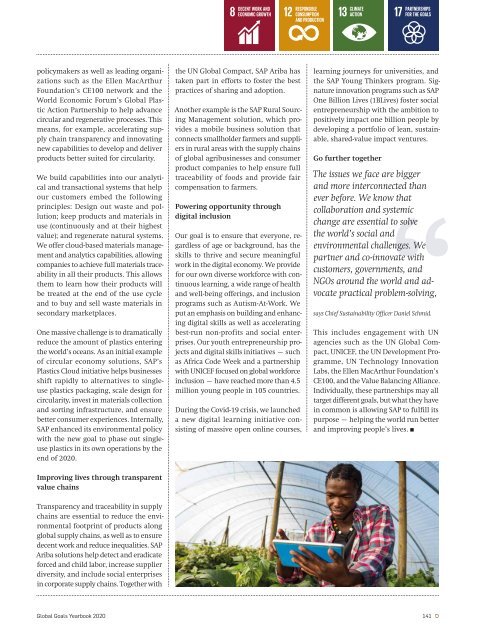Planet under Pressure
The 2020s are the make-or-break decade for Sustainability. But Covid-19 questions almost everything. How can we handle increasingly frequent shocks? What can a resilient society and economy that is in line with planetary boundaries look like? These and many other questions are discussed in the new 2020 edition of the Global Goals Yearbook titled “Planet under Pressure”. The Yearbook supports the UN Sustainable Development Goals and is one of the publications in strong international demand.
The 2020s are the make-or-break decade for Sustainability. But Covid-19 questions almost everything. How can we handle increasingly frequent shocks? What can a resilient society and economy that is in line with planetary boundaries look like? These and many other questions are discussed in the new 2020 edition of the Global Goals Yearbook titled “Planet under Pressure”. The Yearbook supports the UN Sustainable Development Goals and is one of the publications in strong international demand.
You also want an ePaper? Increase the reach of your titles
YUMPU automatically turns print PDFs into web optimized ePapers that Google loves.
policymakers as well as leading organizations<br />
such as the Ellen MacArthur<br />
Foundation’s CE100 network and the<br />
World Economic Forum’s Global Plastic<br />
Action Partnership to help advance<br />
circular and regenerative processes. This<br />
means, for example, accelerating supply<br />
chain transparency and innovating<br />
new capabilities to develop and deliver<br />
products better suited for circularity.<br />
We build capabilities into our analytical<br />
and transactional systems that help<br />
our customers embed the following<br />
principles: Design out waste and pollution;<br />
keep products and materials in<br />
use (continuously and at their highest<br />
value); and regenerate natural systems.<br />
We offer cloud-based materials management<br />
and analytics capabilities, allowing<br />
companies to achieve full materials traceability<br />
in all their products. This allows<br />
them to learn how their products will<br />
be treated at the end of the use cycle<br />
and to buy and sell waste materials in<br />
secondary marketplaces.<br />
One massive challenge is to dramatically<br />
reduce the amount of plastics entering<br />
the world’s oceans. As an initial example<br />
of circular economy solutions, SAP’s<br />
Plastics Cloud initiative helps businesses<br />
shift rapidly to alternatives to singleuse<br />
plastics packaging, scale design for<br />
circularity, invest in materials collection<br />
and sorting infrastructure, and ensure<br />
better consumer experiences. Internally,<br />
SAP enhanced its environmental policy<br />
with the new goal to phase out singleuse<br />
plastics in its own operations by the<br />
end of 2020.<br />
Improving lives through transparent<br />
value chains<br />
the UN Global Compact, SAP Ariba has<br />
taken part in efforts to foster the best<br />
practices of sharing and adoption.<br />
Another example is the SAP Rural Sourcing<br />
Management solution, which provides<br />
a mobile business solution that<br />
connects smallholder farmers and suppliers<br />
in rural areas with the supply chains<br />
of global agribusinesses and consumer<br />
product companies to help ensure full<br />
traceability of foods and provide fair<br />
compensation to farmers.<br />
Powering opportunity through<br />
digital inclusion<br />
Our goal is to ensure that everyone, regardless<br />
of age or background, has the<br />
skills to thrive and secure meaningful<br />
work in the digital economy. We provide<br />
for our own diverse workforce with continuous<br />
learning, a wide range of health<br />
and well-being offerings, and inclusion<br />
programs such as Autism-At-Work. We<br />
put an emphasis on building and enhancing<br />
digital skills as well as accelerating<br />
best-run non-profits and social enterprises.<br />
Our youth entrepreneurship projects<br />
and digital skills initiatives – such<br />
as Africa Code Week and a partnership<br />
with UNICEF focused on global workforce<br />
inclusion – have reached more than 4.5<br />
million young people in 105 countries.<br />
During the Covid-19 crisis, we launched<br />
a new digital learning initiative consisting<br />
of massive open online courses,<br />
learning journeys for universities, and<br />
the SAP Young Thinkers program. Signature<br />
innovation programs such as SAP<br />
One Billion Lives (1BLives) foster social<br />
entrepreneurship with the ambition to<br />
positively impact one billion people by<br />
developing a portfolio of lean, sustainable,<br />
shared-value impact ventures.<br />
Go further together<br />
The issues we face are bigger<br />
and more interconnected than<br />
ever before. We know that<br />
collaboration and systemic<br />
change are essential to solve<br />
the world’s social and<br />
environmental challenges. We<br />
partner and co-innovate with<br />
customers, governments, and<br />
NGOs around the world and advocate<br />
practical problem-solving,<br />
“<br />
says Chief Sustainability Officer Daniel Schmid.<br />
This includes engagement with UN<br />
agencies such as the UN Global Compact,<br />
UNICEF, the UN Development Programme,<br />
UN Technology Innovation<br />
Labs, the Ellen MacArthur Foundation’s<br />
CE100, and the Value Balancing Alliance.<br />
Individually, these partnerships may all<br />
target different goals, but what they have<br />
in common is allowing SAP to fulfill its<br />
purpose – helping the world run better<br />
and improving people’s lives.<br />
Transparency and traceability in supply<br />
chains are essential to reduce the environmental<br />
footprint of products along<br />
global supply chains, as well as to ensure<br />
decent work and reduce inequalities. SAP<br />
Ariba solutions help detect and eradicate<br />
forced and child labor, increase supplier<br />
diversity, and include social enterprises<br />
in corporate supply chains. Together with<br />
Global Goals Yearbook 2020 141
















